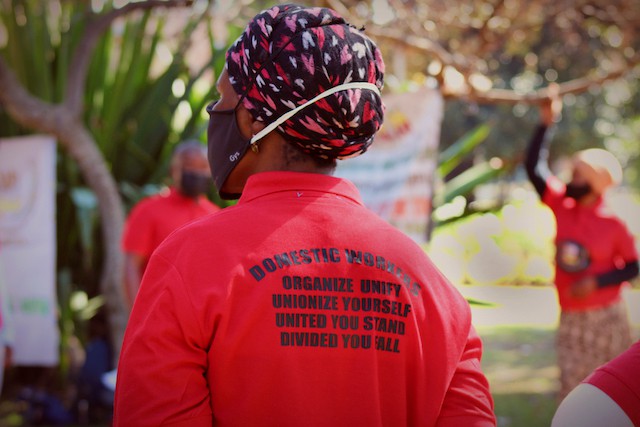
18 June 2021
International Domestic Workers’ Day coincides with the founding day in 2018 of United Domestic Workers of South Africa (UDWOSA). Photo: Masego Mafata
“We made history after winning the fight for the inclusion of domestic workers in the Compensation for Occupational Injuries and Diseases Act (COIDA),” says Pinky Mashiane of United Domestic Workers of South Africa (UDWOSA).
Mashiane was addressing a group of about 40 domestic workers gathered at Burgers Park in Pretoria, to celebrate International Domestic Workers’ Day on Wednesday.
Mashiane gave the group an update on Maria Mahlangu’s COIDA claim. Mahlangu’s case led to a Constitutional Court ruling in November last year that declared the exclusion of domestic workers from COIDA unconstitutional, and that the Act applied retrospectively to 27 April 1994.
“Last Friday, the Mahlangu family and I had a meeting with Gauteng Provincial Chief Inspector at the Department of Labour Advocate Michael Msiza and his team. It was the first time that I saw the Department of Labour and the Compensation Fund addressing the case and understanding how COIDA covers domestic workers,” she said.
Mashiane said she had previously had an experience with an official from the Compensation Fund who was unfamiliar with the retrospective claims process. Following the meeting on Friday, Mashiane said she felt encouraged.
According to Mashiane, Msiza told her that Mahlangu’s claim is being held up because the family she had worked for before she died is refusing to fill in the Compensation Fund forms.
Sylvia Mahlangu, her daughter, told GroundUp that she is considering legal action against the family. “I want the employers to appear in court and tell us what exactly happened when my mother died,” said Mahlangu.
According to Mashiane, the process cannot proceed without the signed Compensation Fund forms. She said getting employers to sign the forms is one of the most challenging parts of the claim process.
“This is exactly why we are calling for the retrospective claims period to be increased to 36 months. Some people still have to go and find their former employers who have sold their houses and moved to new places,” she said.
According to the Compensation Commissioner, Vuyo Mafata, domestic workers only have until November 2021 to submit retrospective claims of the last 27 years. He said any retrospective claim submitted after this period will be “looked at according to its merits”. However, an extension of the retrospective claims period is under consideration.
“The extension of the prescription period for claims is part of the Amendment Bill that is currently in Parliament. We don’t know when Parliament will conclude their processes,” said Mafata.
Mashiane, together with other UDWOSA members, produced a comedy sketch to educate domestic workers about how to apply for COIDA. The skit was performed at Burgers Park as part of the day’s celebrations.
Rose Mahlangu, one of the domestic workers who performed in it, said, “It is great that domestic workers will be compensated for injuries, diseases and death sustained while at work. However, there are still a number of our rights as domestic workers that are not recognised. We still have to fight.”
Mashiane said, while it was important to celebrate the victories, it was equally important to note that there are still many challenges that domestic workers are fighting against.